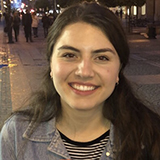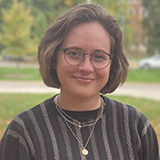Virtual Tutoring Offers Vital Connection for Albion College, Marshall Public Schools Students
Related Programs
Related Posts
Connect With Us
Despite the pandemic, the Ask Albion program delivered an educational experience last fall that may only be the beginning.
January 14, 2021
By Chuck Carlson
Originally, it was a collaboration borne of requirement and necessity. But now a virtual tutoring program called “Ask Albion” has evolved into a new way for Albion College students and students in Marshall Public Schools (MPS) to work together in the name of education.
The program combines several academic components at Albion—the Psychological Science and Education departments as well as the Lisa and James Wilson Institute for Medicine—with the goal of providing remote, but vital, learning experiences for MPS students in need during the COVID-19 pandemic.
The plan was created in the fall and featured some 40 Albion student volunteers and nearly 100 MPS students, including several who asked for tutoring more than once.
Important Volunteer Experience
It was no secret that Albion’s fall semester would be turned upside down due to the pandemic, and that one of the key portions of a learning environment—in-person tutoring—would not be possible.
To that end, Psychological Science professors Dr. Barbara Keyes and Shanti Madhavan-Brown coordinated with Maggie Godfrey, assistant director of the Wilson Institute, and Dr. Randy Davis, superintendent of Marshall Public Schools, to see what was possible.
“We wanted to see how to support MPS and make sure our students get some type of volunteer experience,” Keyes said. “We reached out to Maggie so we could work with students in the Wilson Institute to broaden the experience and, along with Dr. Davis, we brainstormed a virtual study hall.”
“Dr, Keyes saw all of these opportunities to help so many different parts of the community while increasing opportunities for students,” Godfrey said.
And as far as MPS was concerned, any opportunity to provide tutoring services for elementary, middle and high school students was crucial.
“Albion has been a long-term partner with us,” Davis said. “And with the uniqueness of the pandemic laid over it, the question was how to make it viable.”
That was solved in the only way anyone involved could imagine—through collaboration.
“Collaboration is the only way this works,” Madhaven-Brown said, adding that an Albion student registration form was created to determine which subjects students were most comfortable with as tutors and pairing them with MPS students who needed help in those areas. “Where this came up was when we had a student in MPS with a specialized interest and we were able to place them with those more specialized tutors.”
Keeping Students Engaged
But it was also a work in progress the entire semester.
“Logistically you have to coordinate,” Davis said. “But it was the heavy lifting Albion made on their side in terms of structuring that made this work. Students are expressing a need for more engagement in virtual learning and all schools are dealing with it. Anything Albion and we can do to open a portal to get students re-engaged is very important. This goes beyond content; it’s about kids being more comfortable and more familiar in the virtual environment.”
The process was simple enough. MPS students submitted a form to the College with contact information and the type of tutoring sought, and an Albion student followed up with the MPS student. Together, they set up a virtual time to meet (either by Google Meet or phone), with a parent or guardian always accompanying the MPS student.
Albion’s Education Department has also played a vital role in making the virtual tutor program work.
“This opportunity in the virtual format really gave [Albion] students an opportunity to practice their skills,” said Dr. Suellyn Henke, professor of education. “It was wonderful. It was real-world experience, learning how to maintain records and being responsible and setting up meetings with students. This is a win-win, mutually beneficial situation.”
In fact, it went well enough that with in-person meetings still all but impossible, the Ask Albion program will continue in the spring semester.
“There has been a lot of positive feedback,” Godfrey said. “Students are eagerly waiting for more Marshall students who need help. It’s kind of a nice compliment to what was a difficult semester. It’s helping students find a purpose and it’s a chance to find connections.”
“Ask Albion gave students an opportunity to reach beyond the [pandemic] bubble of the College,” Keyes said. “This gave them the sense they were engaging with the community. It’s been a real learning experience.”
‘You Go Where the Need Is’

Eddie Symons, ’23
It’s been a learning experience for the College tutors as well.
For Eddie Symons, ’23, a biology major from St. Charles, Mich., and a member of the Wilson Institute, it was a chance to help repay the tutoring help he received when he was younger.
“I thought it was a good idea to help give back because tutors helped me when I was in middle school and high school,” said Symons, who tutored two Marshall Middle School students in math and plans to continue in the program this spring. “I’m very glad I did it because it’s cool to see the kids being helped while helping them to succeed. And I think it helps me, too.”

Sarah Valiquette, ’21
Sarah Valiquette, ’21, from Grosse Ile, Mich., and who majors in international studies with a concentration in human services, has mentored younger students since she came to Albion and saw the Ask Albion program as another way to help.
“You go where the need is,” said Valiquette, whose assistance last fall ranged from helping elementary school kids in math to high school kids seeking aid in Advanced Placement biology. “The best part is that moment you make that connection with the student and it all starts to click and they understand. It has to be so frustrating for them having to learn online, and then for them to try and learn these things and to finally see them connect and take that deep breath. It’s great to see.”
Ryann Kaplan, ’21, a Kalamazoo, Mich., native majoring in psychology with a minor in educational studies, hopes to attend Michigan State University for her graduate degree in social work. She worked with four students last fall and has tutored two more during winter break.

Ryann Kaplan, ’21
“From my experience, the program has been pretty successful,” she said. “It’s been a challenge navigating the technology when you don’t have the work in front of you and you can’t really see how they’re doing it. But it’s adapting and adjusting for what’s best for the students.”
She said she’s learned that it’s not necessarily navigating the schoolwork that has been the toughest part for the younger students.
“I’ve realized most of the students don’t need help with the material but with encouragement,” she said. “They’re remembering that they’d get it from teachers and classmates and that’s not there right now, so that’s an important part of what we do. And as long as the students are happy, that’s what I’m looking for.”
